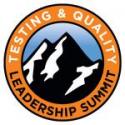Testing & Quality Leadership Summit
Test Leadership on the Edge
Thursday, May 8 (evening) and Friday, May 9 (all day)
|
|
The role of a software tester continues to change as new software processes and new technologies drive the need for better, more effective testing approaches. Join in the conversation with your peers as experienced testing and quality leaders share ways to lead an organization living on the technical edge. Discover how seasoned leaders deal with changes in platform technology, development/testing tools, and agile development methods. At the 2014 Testing & Quality Leadership Summit, summit chair Jeffery Payne brings together senior industry leaders—Alan Page, Rob Sabourin, Johanna Rothman, and others—for an interactive exchange of ideas and experiences. You also won’t want to miss the Test Leader Rumble—a high energy panel discussion and debate between these cutting-edge test leaders. Also, bring your biggest issues and challenges to the Testing & Quality Leadership Summit, where you can draw on theknowledge and experiences of these leaders and your fellow managers who may have already faced and solved some of your issues. You’ll hear what’s working—and not working—and have the opportunity to share your experiences and successes. The Testing & Quality Leadership Summit is a perfect opportunity for you to:
|
|
|
|
|
|
8:00 AM • Registration and Breakfast |
8:30 AM • Leading Cutting-edge Test Organizations
|
|
|||||
9:30 AM • Networking Break |
|||||
9:45 AM • Tester Leader Rumble—A Panel Discussion/Debate
|
|
10:45 AM • Networking Break
|
11:00 AM • Think Tank Discussion: Leadership Solution Brainstorm (Part 1)
|
|
12:30 PM • Networking Lunch Buffet
|
1:30 PM • Think Tank Discussion: Presentation of Results (Part 2)
|
|
2:30 PM • Wrap-up and Ongoing Informal Discussion with Speakers and Attendees |








